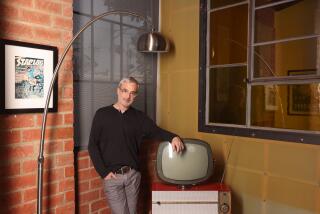Book Review : Debunking the ‘Fairy Tales’ of Science
- Share via
Science a la Mode: Physical Fashions and Fictions by Tony Rothman (Princeton University Press: $19.95; 207 pages)
Science is based on the assumption that there is an objective truth in the world out there that scientists can get closer and closer to through experiment, observation and thought. Scientific truths are therefore not like hemlines, which go up and down with the season and whose truth is socially constructed, a matter of consensus.
The “objective truth” model is an ideal, and we feel it in our bones, but no one can prove whether it is accurate or not. There is also an irreducible element of referendum to truth. In some sense, what’s true is what everybody believes to be true.
Tony Rothman, a physicist and science writer, doesn’t care much for the referendum aspects of truth. For one thing, he says, too often scientists jump on popular bandwagons and accept things as true when they should know better.
Rothman calls himself “a debunker of fairy tales,” and in his book, “Science a la Mode,” he sets out to debunk six popular “fairy tales” of contemporary science.
“I hope after reading the book you will hesitate before hopping on the next bandwagon that rolls by,” he tells us in the preface. “You will in all likelihood not be able to stop it. But at least you can gaze mournfully into the distance as the cymbals and trumpets fade.”
Having read those words, and being something of a congenital iconoclast myself, I was all ready for the book, in which Rothman takes on some standard scientific stories from cosmology to nuclear winter to the duel in 1832 in which the mathematician Evariste Galois was killed.
Inevitably, he bumps up against some of the oldest questions in the philosophy of knowledge, namely, how do we know what we know? and how do we know when something is proved?
Rothman starts off with cosmology, our picture of the universe and how it got started. Virtually every physicist today believes in the Big Bang theory, which asserts that everything in the universe and time itself got going in one gargantuan explosion between 10 and 20 billion years ago.
Of course, no experiments can possibly be performed on events that happened long in the past, so theorists must base their ideas on examining the detritus of that explosion, which is the stuff all around us and out in the universe.
Rothman says that this is like examining tea leaves, and he suggests that there are other possible explanations for the observable data that lead to different theories.
“A scientific approach to cosmology must be based on a consideration of all the alternatives,” he says, “not just the one family of models that happens to be the simplest to consider.”
This argument is true, but it is weak. There are always alternate explanations for things. But just because they are possible doesn’t make them likely.
Rothman argues that while the Big Bang theory has several appealing strengths, it also has some disturbing weaknesses. “The most serious difficulty,” he writes, “is the existence of a singularity at the instant of the Big Bang, that is, a time when the pressure, density, and temperature all become infinite and the known laws of physics break down completely.”
Here we come to the philosophical heart of Rothman’s book. Virtually every theory in science and in life has gaps. Very little that is not trivial explains all the data.
There are two possible responses to the gaps. One is to assert that knowledge is always incomplete and in time the gaps will be filled in. The other is to assert that the gaps prove that the theory is hopelessly flawed.
With regard to the Big Bang theory, virtually every physicist adopts the first view. Rothman adopts the second. In this debate, as in most others, neither side can deliver a knockout blow to the other side. Neither side can prove that it is right.
Rothman’s discussion of nuclear winter takes a different form altogether. Nuclear winter, you may recall, is the theory that an atomic war would fill the atmosphere with soot and ash, cutting off sunlight, causing temperatures to drop and killing most life that had survived the nuclear exchange. This theory was widely discussed a few years ago, though not much has been heard about it lately.
Rothman asserts that the scenario was suspect and scientifically unprovable in the first place but that many scientists withheld their criticisms for political reasons. They wanted to use nuclear winter to increase the public’s anti-war sentiments.
“It is not clear to me at what point a scientific theory should become the basis of a political issue,” he says, “but my instincts tell me that the science should be established first, the politics second.”
This is a very different criticism from his discussion of the Big Bang theory. This verges on deliberate deception rather than mistake.
Rothman uses both examples to argue his point that scientific truths should be treated skeptically. But he does not give sufficient attention to the possibility that most scientists believe scientific truths not because they’re popular but because they’re right.
More to Read
Sign up for our Book Club newsletter
Get the latest news, events and more from the Los Angeles Times Book Club, and help us get L.A. reading and talking.
You may occasionally receive promotional content from the Los Angeles Times.










